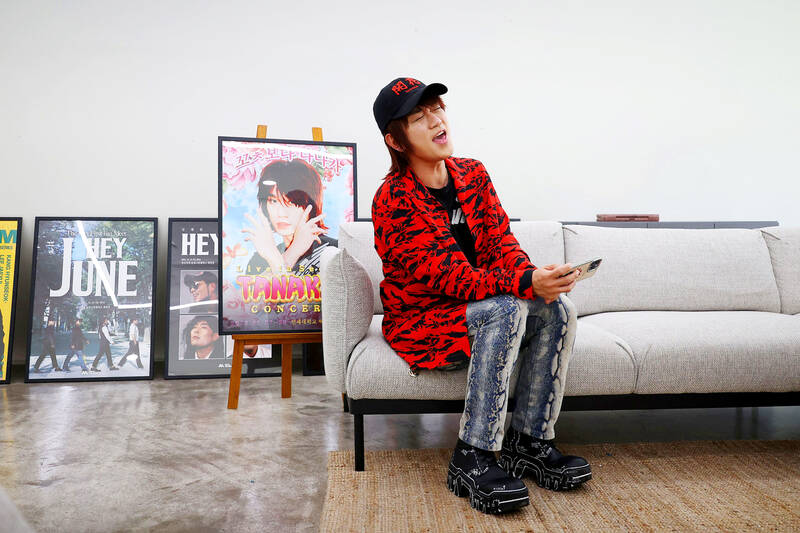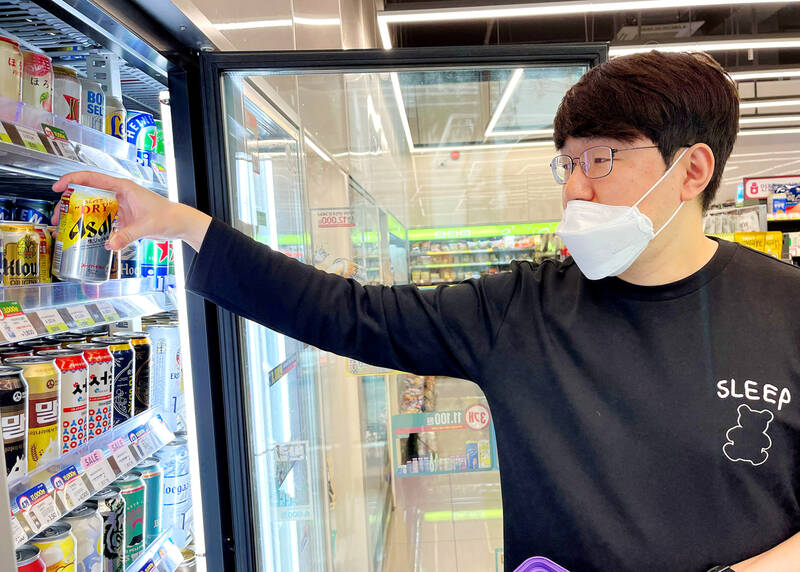Jeong Se-ah feels happy to see Tanaka, a Japanese bar host character from the early 2000s created by a South Korean comedian, because he revives her teenage memories of watching animations from the neighboring nation.
The 24-year-old office worker is one of a growing number of young South Koreans drawn to the products and culture of Japan, coming to see it as more of a friend than a foe that colonized the country 70 years ago, unlike previous generations.
Dressed in a Japan-inspired retro costume and manga accessories among a crowd waiting for Tanaka to begin a concert near Seoul, the capital, Jeong sang a ditty by a Japanese rock group the entertainer idolizes, X Japan.

Photo: Reuters
“I like Tanaka more than his real self,” Jeong said. “There is something really charming and touching about him, and I’ve never seen an artist who tries so hard to make eye contact and communicate with every single fan.”
The character’s easy talk about Japan and its culture built on that allure, she added.
“There was a social environment that sort of encourages boycotting Japanese culture, but people seem to be accepting it naturally,” Jeong said.

Photo: Reuters
YOUTUBE STARS
For his part, Kim Kyung-wook, a once forgotten comedian who has transformed the character into one of South Korea’s hottest YouTube stars and entertainers, said his appeal to the young mattered more than the reason for it.
“I think, for young people, it’s not about why, but just the fact they like something,” said Kim, who became fascinated by Japanese culture as a teenager, leading him to give the character a style and background missing from the Korean scene.
And his persona’s catchy manner of speaking, wolf-cut hairstyle, retro outfits and mastery of old Japanese and K-pop songs have contributed to that success.
Now Kim exemplifies the changing attitudes of young Koreans as ties with Japan thaw. Prime Minister Fumio Kishida, whose visit last month to Seoul was the first by a Japanese leader in 12 years, offered unprecedented personal condolences to wartime victims.
Today’s fervor for Tanaka, with nearly 800,000 Youtube followers, after gigs with famed K-pop stars, such as Taeyang of Bigbang, and a national tour that saw concerts sell out in minutes, is very different from the response to his 2018 debut.
Then, with spats over their shared wartime history flaring between Seoul and Tokyo, Tanaka was hardly popular.
Relations had plunged to their lowest in decades after rows over the neighbours’ history spilled over into trade disputes in 2019, casting a cloud over US-led efforts to counter North Korea’s growing military threat.
DEMAND REBOUND
The quarrels are being left behind as the enthusiasm of young Koreans fuels a sharp rebound in demand for Japanese consumer products.
Last month’s launch of a canned beer by beverage giant Asahi Group Holdings Ltd that is said to better replicate the experience of drinking the draft variety had many enthusiasts camping outside Costco stores in Seoul, ready to sprint to the doors when they opened.
“I’m not a huge fan of Japanese beer, but I saw it on social media, and it’s true that people’s perceptions of Japan have improved a lot,” said Son In-seok, 39, who waited for days to get his hands on the new beer in a convenience store.
South Korean imports of Japanese beer and whisky surged nearly 250 percent and 300 percent respectively in the first quarter from the figures of 2020, while inbound garment shipments jumped almost 47 percent.
That compared with a 90 percent drop in imports of Japanese beer in 2019, when the intensifying feuds made it an early target of a sweeping boycott.
Some Korean victims of Japanese military brothels and forced labor during its colonial rule from 1910 to 1945 demand an apology and compensation from Tokyo.
But officials say changing attitudes emboldened President Yoon Suk-yeol to risk political backlash with a March offer of compensation for such victims with funds from Korean corporates, rather than Japanese firms, as Seoul’s courts had ordered.
A January poll by Hankook Research showed Japan’s likeability score among Koreans was the highest since 2018, with those aged 29 or younger the most favorable.
China, which had scored nearly twice the levels of Japan in 2019, rated among the lowest, alongside Russia and North Korea.
A March survey by the same pollster showed 40 percent of Koreans backed Yoon’s compensation plan, with 53 percent opposed. But more than 51 percent of respondents aged 29 or less backed it, while 36 percent viewed it negatively.
Political dynamics are spurring the young to take a less antagonistic view of Japan, said James Kim, a regional specialist at the Asan Institute for Policy Studies.
“China is clearly less preferred than countries like the United States and Japan,” Kim said, citing Beijing’s curbs on freedom in Hong Kong and during the COVID-19 pandemic.
Even if younger people are not completely satisfied by South Korea’s efforts to resolve thorny historical issues, Kim added, “They see a more immediate threat and recognize the benefit of aligning with other like-minded democracies in the region.”

On April 26, The Lancet published a letter from two doctors at Taichung-based China Medical University Hospital (CMUH) warning that “Taiwan’s Health Care System is on the Brink of Collapse.” The authors said that “Years of policy inaction and mismanagement of resources have led to the National Health Insurance system operating under unsustainable conditions.” The pushback was immediate. Errors in the paper were quickly identified and publicized, to discredit the authors (the hospital apologized). CNA reported that CMUH said the letter described Taiwan in 2021 as having 62 nurses per 10,000 people, when the correct number was 78 nurses per 10,000

As we live longer, our risk of cognitive impairment is increasing. How can we delay the onset of symptoms? Do we have to give up every indulgence or can small changes make a difference? We asked neurologists for tips on how to keep our brains healthy for life. TAKE CARE OF YOUR HEALTH “All of the sensible things that apply to bodily health apply to brain health,” says Suzanne O’Sullivan, a consultant in neurology at the National Hospital for Neurology and Neurosurgery in London, and the author of The Age of Diagnosis. “When you’re 20, you can get away with absolute

May 5 to May 11 What started out as friction between Taiwanese students at Taichung First High School and a Japanese head cook escalated dramatically over the first two weeks of May 1927. It began on April 30 when the cook’s wife knew that lotus starch used in that night’s dinner had rat feces in it, but failed to inform staff until the meal was already prepared. The students believed that her silence was intentional, and filed a complaint. The school’s Japanese administrators sided with the cook’s family, dismissing the students as troublemakers and clamping down on their freedoms — with

As Donald Trump’s executive order in March led to the shuttering of Voice of America (VOA) — the global broadcaster whose roots date back to the fight against Nazi propaganda — he quickly attracted support from figures not used to aligning themselves with any US administration. Trump had ordered the US Agency for Global Media, the federal agency that funds VOA and other groups promoting independent journalism overseas, to be “eliminated to the maximum extent consistent with applicable law.” The decision suddenly halted programming in 49 languages to more than 425 million people. In Moscow, Margarita Simonyan, the hardline editor-in-chief of the